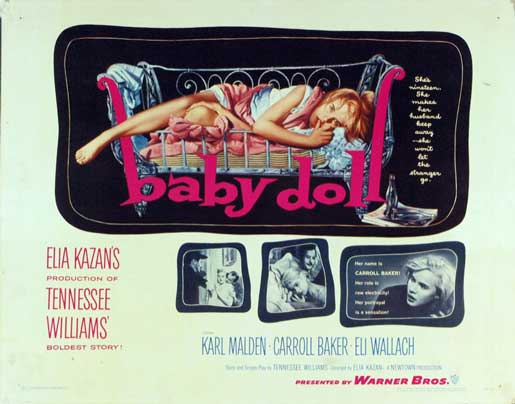
BABY DOLL
US, 1956, 114 minutes, Black and white.
Eli Wallach, Carroll Baker, Karl Malden, Mildred Dunnock.
Directed by Elia Kazan.
Baby Doll was written for the screen by Tennessee Williams. It is based on two one-act plays of his, Twenty- Seven Wagons Full of Cotton and The Unsatisfactory Supper.
Baby Doll achieved some notoriety in its time. Cardinal Francis Spellman of New York wanted to organise Catholics to protest and boycott the film.
In retrospect, it is typical Tennessee Williams material, Deep South plantation life. Karl Malden portrays the owner of a factory. He has a young bride and is to consummate the marriage when she turns twenty. However, he has a rival in Eli Wallach who suspects that he burnt down his factory and is bent on getting revenge – using Baby Doll.
The film has an atmosphere of decay, of madness, brutality, sexual smouldering. Karl Malden had already appeared in Tennessee Williams’ A Streetcar Named Desire. Carroll Baker was at the beginning of her career as was Eli Wallach. Mildred Dunnock portrays the demented aunt.
The film seems somewhat dated now, especially in its black and white style. However, it was directed by Elia Kazan who had won Oscars for Gentlemen’s Agreement and On the Waterfront and had made a great number of classic films in the 1940s and 1950s including A Tree Grows in Brooklyn, A Streetcar Named Desire. He was to go on to direct interesting films like Wild River and The Arrangement as well as his autobiographical America, America.
The film is interesting to look at, especially in its moral issues and treatment in view of changing standards and approaches to moral issues in the ensuing decades.
1. The significance and tone of the title? Its indications of themes?
2. Comment on the structure of the film, its confined effect, its place and limitation of character, the emphasis on clashes and emotional struggles. The role of Tennessee Williams' theatre background?
3. How important was the south and its atmosphere? The way the film created this? The close world of the south, incipient madness, the stifling and suppression of emotions, the repression and outburst?
4. The contribution of the black and white photography? The setting of the house and its decay and need of rebuilding, the building atmosphere, the town, the sleazy and lazy background and the heat, the lounging whites, the laughing and critical negroes? The musical background?
5. How central was Archie to the film? What kind of man was he, his background, his nervousness, his work and its failure, his jealousy of the mill, his heritage and rebuilding the house, his ambitions and their driving him to burn the mill? Audience sympathy and interest in him?
6. Archie and his marriage: the reason for the marriage, Baby Doll's father, the non-consummation, the pressure of the non-consummation night, the way that Archie related to her, the baby talk, spying on her, sexual frustration, his bargains, his capacity for journey, Baby Doll's maddening him, urging him to collapse? Audience insight and sympathy here?
7. The character of Baby Doll and Carroll Baker's performance? The initial sequences at home, her tantalising Archie at home, her little-girl attitudes, her dollish attitudes, her background and her memory, the consummation of the marriage and her attitudes towards sexuality? Her being spoilt in keeping him waiting for the car, wanting ice cream, shopping? The fact that she could be fascinated by Vaccaro? Her attitude of playfulness, becoming serious? The seduction by Vaccaro and her being led, ridiculing Archie? The final disillusionment?
8. How well was the character of the Sicilian drawn? The sequence of his award and the self-made man, his enjoyment of congratulations, the effect on the fire and his desperate trying to save the mill? Drawing out the evil in him, suspicions of Archie, seduction of Baby Doll? His love for her and hatred?
9. The significance of Aunt Rose: the initial answering of the phone, helping all her relations, her cooking of the meals and Archie's criticism, her potential for insanity, her remaining by Baby Doll at the end?
10. How did the film control its changing moods, by conversations, the moods when Archie and Baby Doll talked? The mood of the town? The moods of Vaccaro and his afternoon with Baby Doll, tender, severe, hating, the meals and the change in conversation, Vacarro's final vindictiveness?
11. How did the film rely on scenes for its mood and themes, for example, Archie looking at Baby Doll, Baby Doll at the mill, the fire sequences, the meal?
12. The strength of the dialogue, the insight into an enclosed world as a mirror for the wider world?